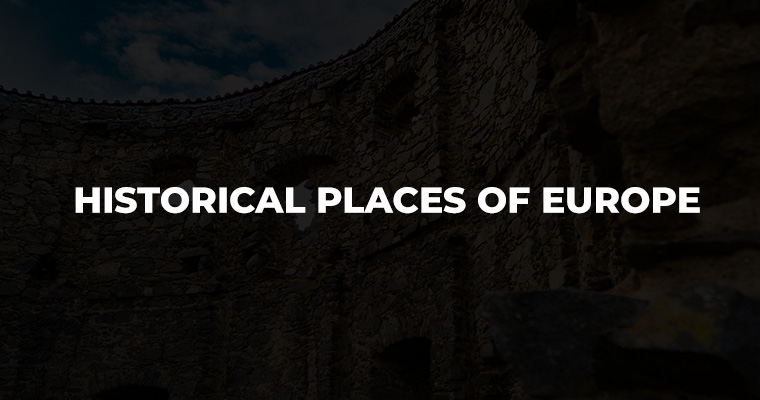Historical Places Of Europe
This article is about historical places in Europe.
Cave monastery of Geghard
Location: Armenian
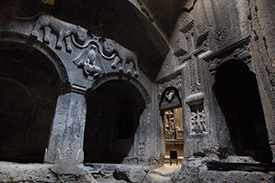
The main chapel was built in 1215, the monastery complex was founded in the 4th century by Gregory the Illuminator at the site of a sacred spring inside a cave. It stands deep in a canyon and blends in with the surrounding cliffs. The complex is partly dug out of the mountainside with annexed buildings. The two cave churches and vestibules you see today are all from the 13th century. Above the main entrance to the churches is a 10 m passage which leads to a cave chapel that is fully carved out of the mountain and has amazing acoustics. A small peephole in the corner makes it possible to look into the cave chamber. The monastery got its name “Geghardavank” – meaning “the Monastery of the Spear” – since the spear that wounded Christ on the cross was kept.
Former empires
Location: western Azerbaijan
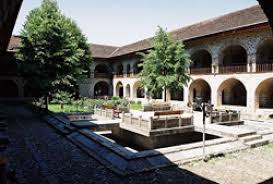
Former home of Khans (kings) the town of Sheki, is a treasure-trove of historical architecture. On a small fortified hill, near the centre of town, sits the wonderful Palace of Sheki Khans. Also within the fort grounds are several excellently preserved Albanian churches. And while the town has a number of hotel choices, one cannot resist staying in the 18th century Caravansary Hotel. Although rather simple, this is an absolute bargain considering the building seemingly transports you back to a time long since passed. Priceless!
Dubrovnik
Location: Dalmatia
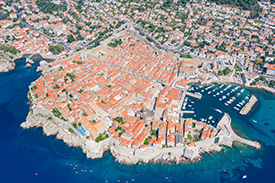
Dubrovnik is the iconic Adriatic medieval walled city. In the middle Ages it flourished in maritime trading as the city-state of Ragusa and was rivalling Venice. During the Yugoslavian war, in the beginning of the 90’s, it was sieged for seven month and got severe damaged by artillery attacks. Today Dubrovnik is again insane pretty and manicured to limit that it’s almost too much. Just to top it off, there are beaches with the most crystal-clear water you can imagine, but screamingly cold. All this makes of course Dubrovnik to the perfect tourist magnet and the stream of tourist buses also seems never-ending, but it is still possible to find adorable corners, without being run over by sunburned tour group.
Mosaic at Paphos
Location: Roman
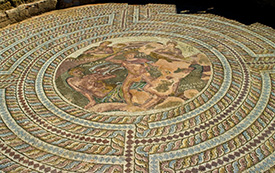
During at long period in ancient times Paphos was a Roman city (around 2nd and 3rd century AD). It was a prosperous place where exquisite tiles floors were in high fashion among the wealthy. Each mosaic tells a story, often about Greek mythology. They are a part of the sprawling Paphos Archaeological Site which begins down at Paphos harbour.
Salamis Ancient Roman Ruins
Location: Cyprus
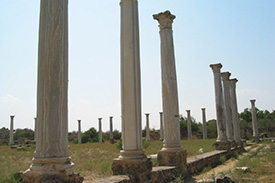
In 11th century BC, the town was confined to a rather small area around the harbour but soon expanded westwards to occupy the area, which today is covered by forest. The splendid Roman Ruins at Salamis is one of Cyprus’s best archaeological site. An extensive area which once was a prosperous Roman city about 2000 years ago. Though most of the structures have been reduced to crumbling walls and columns, making it hard to figure out what they once were, some have been restored to some degree, making it possible to get an idea of how grand the city of Salamis once were. The whole area is kept wild with bushes and high grass covering the ruins, making a visit rather adventurous.
Tombs of the Kings
Location: Cyprus
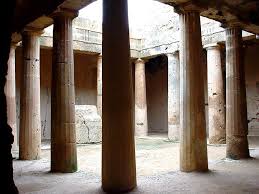
The collection of underground tombs, many of which date back to the 4th century BC, are carved out of solid rock, and are thought to have been the burial sites of Pathetic aristocrats and high officials up to the third century AD.Flanked by the sea on one side and resorts on the others lies this gem of an open-air museum. There are seven excavated tombs scattered over the rather large site. Some are cut into small hills, while others are underground, imitated the houses of the living. Not much is fenced off and there are staircases so you can descend into the tombs, which all are empty.
Temple of Apollo Epicurus
Location: Greece
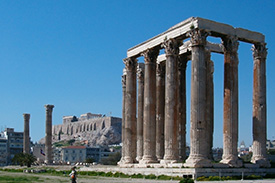
The architect Iktinos who designed the Parthenon did more than just that. On the Peloponnese peninsula, stands the by-him-designed temple of Apollo Epicurus, also called the temple of Bassae (Vasses). It is one of the best kept temples of its time and has some quite unique features. You can only walk around the temple but unfortunately not enter the central area. Inside used to be some nice friezes, which as so many ancient Greek art has been taken to London in the early 19th century.
For decades, this temple has been undergoing restoration works and in order to protect it from the elements it has been covered by a large tent, which prohibits a full-sized view. It looks like it will still be covered for quite a while. Many of the columns need to be entirely removed in order fix the fundaments of the temple.
The remote location of this temple still makes a great place to visit.
World’s Oldest Parliament
Location: Iceland
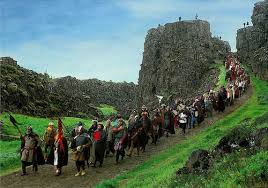
It named as Tynwald, started in 930 AD as world’s first democratic parliament. They had written laws which stated what has to be done to whom, when such and such crime was committed. At the annual assembly at Þingvellir, when people from all over Iceland would gather, these laws were recited at the Law Rock, maybe new were passed by the cheifmen, and disputes were settled. Every issue affecting Iceland were discussed on this site. Today, there are of course nothing left from the Viking age, besides the spectacular natural setting right at the rift valley created by the separation of the North American and Euroasien tectonic plates, but that will also do.
Roros
Location: Norway
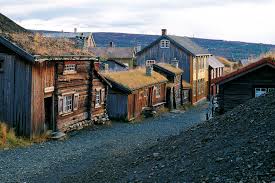
Røros is a delightful old copper-mining town, consisting of turf-roofed wooden miners’ cottages. But even the newer parts of town are quaint. Surrounded by mountains that remain snow-clad until early summer, Røros is small enough to walk around. There is also an 18th century church, a museum and several galleries worthy of a visit, and cafes line the main street. While it lacks a water-front setting, it certainly gives Bergen a run for its money in terms of pure aesthetics, and is not nearly as overrun by visitors. It is also possible to go on a cold, damp, subterranean tour of the old copper-mine, some distance out of town. And if all else fails, Røros is a good place for people watching, as its inhabitants seem to enjoy dressing up in traditional folk outfits for the slightest reason.
Bronze Age cemetery
Location: Scotland
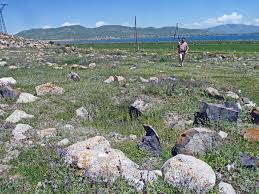
These stone rings are prehistoric burial chambers from the late 3rd millennium BC. There are about fifty of those, so-called clava cairns. Probably the most well-known is the Balnuaran of Clava not far from Inverness. You will find three chambers, two with chamber-passages and one without, each encircled by big standing stones – a bit like Stonehenge. Cremated bones have been found inside the chambers, but else not much is known about these mysterious Bronze Age cemeteries.
